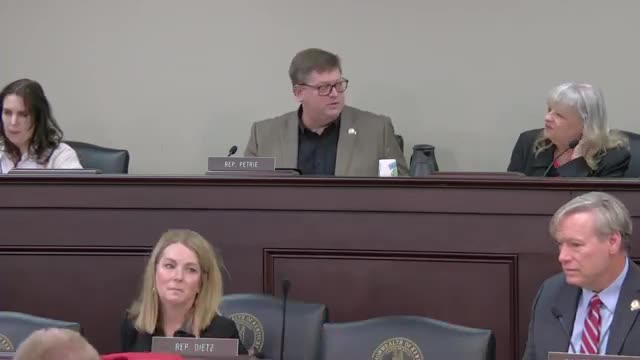House Appropriations committee reports favorably on bill to cut Kentucky individual income tax to 3.5%
Get AI-powered insights, summaries, and transcripts
Subscribe
Summary
The House Standing Committee on Appropriations and Revenue voted to report House Bill 1 favorably after testimony warning of large, long-term revenue losses. The committee vote was 17 yes, 0 no, and 3 pass; the bill would reduce the individual income tax rate to 3.5% effective Jan. 1, 2026.
FRANKFORT, Ky. — The House Standing Committee on Appropriations and Revenue voted to report House Bill 1 favorably Wednesday, advancing a measure that would reduce Kentucky—s individual income tax rate to 3.5% beginning Jan. 1, 2026.
The bill, sponsored by Representative Jason Petrie, drew a single witness for the committee: Jason Bailey, executive director of the Kentucky Center for Economic Policy, who told the committee the change would deepen long-term revenue shortfalls and pose risks to state services and poorer rural counties. "Another cut would cost $718,000,000 a year, once fully phased in, for a total of $2,200,000,000 in annual loss revenue from the 3 half point cuts," Bailey said. He also said the state forecast predicted a $213,000,000 revenue decline this year and warned that prior temporary revenue surpluses had masked the long-term effects of permanent tax cuts.
Why it matters: Bailey told the committee that income tax revenue previously made up roughly 40% of the general fund and that further permanent reductions would shift the fiscal burden at a time when federal pandemic aid has ended and inflation growth has slowed. "We—re already seeing those problems begin to emerge," Bailey said. He cited potential impacts on K-12 funding, higher education, behavioral health, childcare and public-sector jobs in health care and education.
Committee discussion focused on the scope and timing of the change and on the policy rationale for continued income tax reductions. Representative Gentry said he planned to "pass" on the bill at the committee stage to review more data, citing distributional concerns: "I feel like it benefits higher income people at the expense of very lower income people," he said. Committee members asked whether the bill would create other tax changes; staff and the sponsor said the bill is limited to the individual income tax rate and conforming date changes.
Formal action: The committee moved and seconded consideration of House Bill 1 and voted to report it favorably with expression. The committee recorded 17 yes votes, 0 no votes and 3 pass votes; the clerk announced the bill will be reported to the full House. The committee did not adopt any amendments during the meeting.
Next steps: House Bill 1 will be placed on the House calendar for further consideration on the floor. If enacted as written, the reduced rate would take effect Jan. 1, 2026. Representative Jason Petrie, who sponsored the bill and chaired the hearing, closed the meeting after the vote.
Source material: Testimony and roll-call statements occurred during the Jan. 8, 2025 meeting of the House Standing Committee on Appropriations and Revenue; the committee recorded the favorable report with 17 yes, 0 no, and 3 pass votes.
